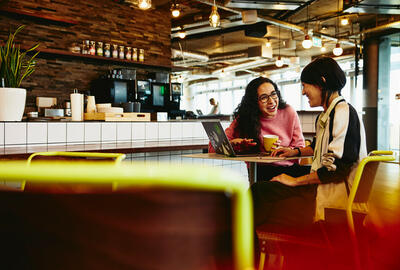Our latest report on employee satisfaction - the 2021 Randstad Employer Brand Research - this year revealed a more positive narrative, with a booming economy and high demand for candidates to fill roles only emphasising the importance of brand resilience and maintaining reputation during periods of uncertainty.
At a time when the COVID-19 pandemic, shutdowns and social distancing measures have so drastically changed not only the way we work but the way we live our lives, it's encouraging to see a growing return of employee confidence when it comes to exploring new opportunities.
The COVID-19 pandemic has created a shift to a new type of work that is based on flexibility, compromise and remote working. And amid the cloud of uncertainty while we all readjusted to a new way of working, what we saw last year was employees putting plans to take on new roles on hold.
But this latest report shows a sea-change in sentiment since then. That confidence is back, with employees increasingly confident about moving roles or even sectors, and it’s being supported by a tsunami of pent up demand. This is particularly the case around technology and digital transformation roles or even healthcare.
It’s clear that times are changing, and what is interesting is the combination of these two things - renewed confidence and pent up demand - look set to change the landscape of Australia’s recruitment sector for some time yet.
But while the report is positive, now is not the time for organisations to become complacent.

building brand strength and loyalty
As Australia bounces back from the worst of the pandemic’s impact, it is now more important than ever for organisations to build brand strength and loyalty in order to retain and attract talent as our economy continues its journey out of this crisis.
It’s clear to me that our clients who were able to adapt to the changing markets and economy are the ones who are better off for it. Employer branding is critical in standing out to new employees in a market where they’re fighting competitors for the best talent.
And this is clear in the report when employees discuss loyalty. It’s so interesting to see that even through times of uncertainty, furlough, cost-cutting etc. the way Australian employers have supported their employees and handled the pandemic has seen them rewarded with loyalty.
In fact, there were some surprising data in the mix. Some of the organisations and sectors hardest hit by the pandemic came out on top in this year’s Top Employers list, even those where job security was at an all-time low, further emphasising a shift in employee sentiment.
Interestingly, the report also shows that working from home contributed to an employee’s loyalty to their company with a whopping 61-70 per cent of employees who work from home some or all of the time feeling more loyal towards their employer because of how they managed the COVID-19 situation.
It’s an impressive statistic and a trend that employer branding can piggyback.
What it also shows us is that now is the time to make a difference. Well-being and resilience are so critical in today’s market that it’s absolutely essential for all organisations to take a step back and have a look at what career progression, flexibility and a hybrid working environment mean to their current and prospective employees.
Organisations need to think: The age where we all worked five days in the office is a thing of the past, so how do I make my organisation stand out amid others in the workforce of the future?
Our report shows that giving employees flexibility and allowing a hybrid working environment, all while still giving support and creating opportunities for relationships and communication is what sets a great organisation apart from an excellent one and will help to drive loyalty and retention from its employees.
So now is the time for organisations to put some time and funds into their employer branding and get those key messages and role models out into the market to show how integral these themes are to the core of their business.
period of adjustment
When it comes to what employees want, work-life balance tops the list followed by an attractive salary and benefits and then job security, and this has been the case for some time now. But what is different this year is the level of intensity in terms of just how important these things are to employees.
We have to remember we have had a low wage environment for some time, followed by the COVID-19 pandemic which has caused a more competitive market with an uplift in demand in some particular hotspot areas.
Then to add another layer on top of that, our closed international border is increasing pressure further.
There is huge uncertainty as to when the borders will open to immigration and when it does, what that will look like and how many people will be allowed to enter. And the need for organisations to face this period of adjustment, whether they are prepared or anticipated it or not, is right now.
The reality is that from flexibility to perks and diversity and inclusion (D&I), strategies around retention and attraction are now more pronounced. Increasing salary is not sustainable in the long-term so organisations need to take a different approach to create much more meaningful mid-long term strategies to pull the top talent in.
D&I is a great example of how organisations can put emphasis on a greater diversity of talent as a more pronounced strategy that will act as a strong drawcard for prospective employees.
But what exactly these strategies look like for your organisation depends on how you think you should and could position yourself and build your brand as a forward-thinking business.
And we’re not talking about temporary strategies here to tide us over until ‘normal’ returns, because even when borders reopen Australia will never return to its pre-COVID-19 state.
Given the level of demand is so high, these medium-to-long-term strategies are ones that could and should stick around far into the future.
taking the next step
The reality unfortunately is that if you and your organisation are slow to innovate and make a change then you’ll lose out to competitors.
Meanwhile, organisations that are fast to adapt to the new environment and are able to implement effective medium-to-long-term strategies and employer branding research to support a systemic shift in the way they do business, are the ones who will come out the other side stronger than ever.
It is encouraging to see a positive shift in employee sentiment and confidence in the latest REBR report. Likewise, the uptick in employee loyalty to employers, even during times of crisis further represents how powerful it is for employees to position and brand themselves within the market.
But there is much more work to do.
Now, more than ever, organisations need to continue looking at how they can build brand strength and loyalty in order to retain and attract talent and remain both relevant and competitive as Australia shifts to its new normal working world.





